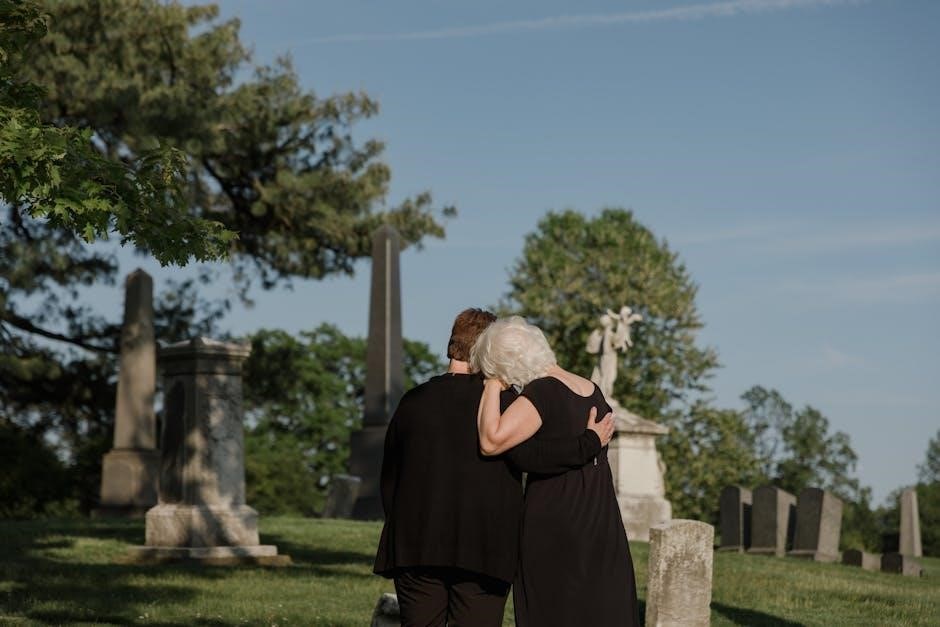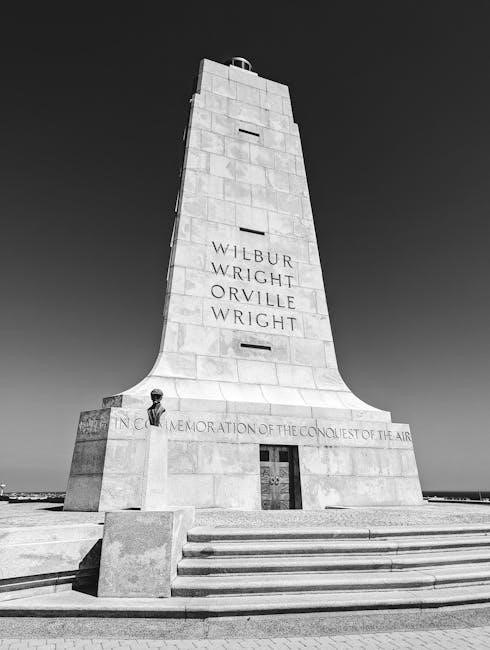Memorial Day sermons, often available in PDF format, honor fallen heroes while blending patriotism with faith․ These sermons provide comfort, reflection, and gratitude, connecting remembrance with spiritual renewal․
Understanding the Significance of Memorial Day
Memorial Day holds profound significance as a day to honor fallen heroes who sacrificed their lives for freedom․ Originating as Decoration Day, it transcends mere celebration, inviting reflection on the cost of liberty․ Sermons in PDF format often highlight its biblical roots, such as Exodus 12:14, which emphasizes remembrance as a sacred duty․ Memorial Day is not just a holiday but a moment to connect faith and patriotism, offering comfort to the bereaved while celebrating the bravery of those who served․ It encourages gratitude for sacrifices made and reinforces the enduring value of freedom, blending solemn remembrance with hope and renewal․
Overview of Memorial Day Sermons in PDF Format
Memorial Day sermons in PDF format are widely available, offering reflections on sacrifice, gratitude, and hope․ These sermons often blend patriotism with faith, providing comfort to the bereaved while honoring fallen heroes․ Many include biblical references, such as Exodus 12:14, emphasizing remembrance as a sacred duty․ They also highlight the intersection of faith and patriotism, encouraging congregations to reflect on the true meaning of freedom․ These PDF resources are structured to guide worship services, featuring prayers, scripture readings, and heartfelt messages․ They serve as accessible tools for pastors and congregations, ensuring the legacy of sacrifice is remembered and celebrated with reverence and grace․


The Religious Significance of Memorial Day
Memorial Day holds deep religious meaning, reflecting themes of sacrifice, remembrance, and eternal life․ It connects faith traditions with national gratitude, honoring lives lost for freedom․

Memorial Day as a Day of Remembrance in the Bible
Memorial Day resonates with biblical themes of remembrance, as seen in Exodus 12:14, where God instructs Israel to observe Passover as a memorial․ Similarly, Memorial Day honors fallen heroes, reflecting the biblical mandate to remember and honor sacrifices․ Many sermons draw parallels between national remembrance and sacred traditions, such as the Lord’s Supper, which commemorates Christ’s sacrifice․ These sermons emphasize that remembrance is not just about the past but also about living with purpose and gratitude․ By connecting Memorial Day to biblical principles, faith communities find deeper meaning in honoring those who have given their lives for freedom and peace․
The Role of Sacrifice in Memorial Day Sermons
Memorial Day sermons often emphasize the profound significance of sacrifice, both in a national and spiritual context․ These sermons highlight the ultimate sacrifice of fallen heroes who gave their lives for freedom and justice․ Drawing from biblical teachings, they connect this sacrifice to Christ’s sacrifice, which serves as the foundation of redemption․ Many sermons reference the Lord’s Supper as a symbol of remembrance and gratitude for sacrifices made․ By reflecting on these acts of selflessness, congregations are inspired to honor the legacy of the fallen and live with renewed commitment to faith, freedom, and service․ Sacrifice is portrayed as a cornerstone of both national and spiritual identity․
Connecting Memorial Day to the Christian Faith
Memorial Day sermons often draw parallels between national remembrance and Christian teachings, emphasizing sacrifice, gratitude, and eternal hope․ Many sermons highlight the biblical mandate to honor those who have laid down their lives, referencing passages like Exodus 12:14, which speaks of days of remembrance․ The ultimate sacrifice of Christ is frequently connected to the sacrifices of fallen heroes, illustrating the redemptive power of selfless love․ Sermons also encourage believers to reflect on the hope of eternal life, offering comfort to the bereaved․ By linking Memorial Day to Christian faith, these sermons provide a spiritual framework for understanding sacrifice, honor, and the enduring legacy of love and service․

Key Themes in Memorial Day Sermons
Themes include honoring fallen heroes, patriotism, sacrificial love, hope, and comfort for the bereaved, connecting faith with national remembrance and unity․
Honor and Gratitude for Fallen Heroes
Memorial Day sermons emphasize the profound importance of honoring and expressing gratitude for fallen heroes who have made the ultimate sacrifice for their nation․ These sermons often highlight their bravery, selflessness, and commitment to protecting freedom and justice․ By reflecting on their lives and service, congregations are reminded of the high cost of liberty and the enduring value of patriotism․ Many sermons draw parallels between the sacrifices of military heroes and the teachings of faith, emphasizing the connection between service to country and service to a higher purpose․ This theme fosters a sense of unity and shared responsibility, encouraging communities to continue upholding the principles these heroes defended․ It also provides comfort to families and friends of the fallen, reinforcing their loved ones’ legacy through collective remembrance and gratitude․
The Intersection of Faith and Patriotism
Memorial Day sermons often explore the profound connection between faith and patriotism, highlighting how spiritual values align with national pride․ Many sermons emphasize that patriotism is not just about loyalty to a nation but also about living out faith-based principles such as justice, compassion, and sacrifice․ For example, the Episcopal Church’s sermons frequently draw on biblical teachings to illustrate the moral foundation of honoring fallen heroes․ The intersection of faith and patriotism creates a powerful narrative, encouraging believers to see their civic duty as an extension of their religious calling․ This blending of devotion to God and country provides a deeper sense of purpose and unity, especially during times of remembrance and reflection․
Hope and Comfort for the Bereaved
Memorial Day sermons often provide hope and comfort to those grieving the loss of loved ones who served their country․ These sermons emphasize the promise of eternal life and the assurance that their sacrifices were not in vain․ Through biblical teachings, pastors offer solace by reminding congregations that death does not separate us from God’s love․ Many sermons highlight the resurrection and the hope of reunification, bringing emotional relief to families and friends․ The messages also encourage communities to support the bereaved, fostering a sense of shared remembrance and healing․ While grief is acknowledged, the focus remains on the enduring legacy of faith and the promise of eternal peace․

Historical Context of Memorial Day Sermons
Memorial Day sermons trace the holiday’s origins from Decoration Day after the Civil War, evolving into a solemn observance honoring sacrifices, patriotism, and faith․
Origins of Memorial Day and Its Evolution
Memorial Day originated as Decoration Day after the Civil War, honoring fallen Union soldiers․ Families decorated graves with flowers, symbolizing love and remembrance․ Over time, it evolved to commemorate all U․S․ military deaths, becoming a national holiday in 1971․ Religious leaders played a crucial role, linking the day to biblical themes of sacrifice and memorials, as seen in Exodus 12:14․ Sermons often reflect this evolution, blending patriotism with faith, offering comfort to the bereaved and emphasizing the importance of honoring those who gave their lives for freedom․ The holiday’s religious and historical roots continue to shape its observance today․
Historical Examples of Memorial Day Sermons
Historical Memorial Day sermons often reflect the cultural and spiritual context of their time․ For instance, a 2023 sermon by Pastor Jons highlighted Acts 2:1-21 and Psalm 104, linking Pentecost and Memorial Day themes․ A 2020 sermon by Rev․ Dr․ Ralph W․ Bayfield emphasized sacrifice and remembrance, while a 2018 sermon from John Wesley United Methodist Church used Ecclesiastes 3:1-8 to address life’s transient nature․ These sermons illustrate how religious leaders have historically used scripture to comfort the bereaved and honor fallen heroes, blending patriotism with faith․ Such examples demonstrate the enduring role of Memorial Day sermons in connecting spiritual reflection with national remembrance․
Examples of Memorial Day Sermons from Specific Churches
Episcopal and Methodist churches offer notable Memorial Day sermons․ Rev․ Dr․ Ralph W․ Bayfield’s 2020 Episcopal sermon emphasized sacrifice, while a 2018 Methodist sermon reflected on life’s transient nature, blending patriotism with faith for comfort and remembrance․

Episcopal Church Sermons on Memorial Day
Episcopal Church sermons on Memorial Day often blend patriotism with faith, reflecting on sacrifice and remembrance․ Rev․ Dr․ Ralph W․ Bayfield’s 2020 sermon, from the Church of the Good Shepherd, emphasized the sacred duty to honor fallen heroes․ These sermons, available in PDF, highlight the intersection of faith and national pride, offering comfort to the bereaved․ They draw parallels between biblical memorials, like the Exodus feast, and modern-day tributes․ Episcopal leaders use scripture to provide solace, reinforcing the belief that sacrifice is not in vain․ These sermons are a powerful way to connect spiritual renewal with national remembrance, fostering unity and hope․
Methodist Church Sermons on Memorial Day
Methodist Church sermons on Memorial Day emphasize honor, sacrifice, and comfort․ Pastors often use scripture, such as Ecclesiastes 3:1-8, to reflect on life’s fleeting nature and eternal hope․ John Wesley United Methodist Church sermons highlight patriotism intertwined with faith, encouraging congregations to remember fallen heroes․ These sermons, available in PDF, focus on the intersection of grief and gratitude, offering solace to the bereaved․ Methodist leaders emphasize the importance of community and shared remembrance, aligning Memorial Day with Christian values of love and sacrifice․ Their messages inspire reflection on freedom’s cost and the enduring hope of resurrection․
Delivering Memorial Day sermons requires preparation, sensitivity, and engagement․ Pastors use PDF resources to craft messages that honor sacrifices and offer comfort, ensuring relevance and impact․ Preparing a Memorial Day sermon involves prayerful reflection, scripture selection, and historical context․ Start by researching themes like sacrifice, gratitude, and hope․ Use Bible passages, such as Exodus 12:14 or Ecclesiastes 3:1-8, to connect remembrance with faith․ Personalize the message by sharing stories of fallen heroes or congregational experiences․ Incorporate hymns and prayers to create a solemn yet uplifting atmosphere․ Review sermon outlines from PDF resources to ensure clarity and impact․ Practice delivery to convey empathy and inspiration․ Finally, tailor the sermon to your congregation’s needs, ensuring it honors the past while offering comfort and hope for the future․ Engaging congregations with Memorial Day messages requires a blend of storytelling, personal reflections, and interactive elements․ Begin with a poignant story of sacrifice, then invite the congregation to share memories of loved ones․ Use Bible verses like Ecclesiastes 3:1-8 to emphasize life’s seasons and God’s providence․ Incorporate moments of silence or prayer to create a sacred space for reflection․ Highlight how faith and patriotism intersect, encouraging attendees to honor heroes while trusting in God’s plan․ Conclude with a message of hope, reminding the congregation that grief is not without comfort․ Use PDF sermon outlines to structure the message, ensuring it resonates emotionally and spiritually with all listeners․ Memorial Day sermons in PDF format offer a meaningful way to honor sacrifices, reflecting on faith, gratitude, and renewal, providing comfort and hope to all who remember․ Memorial Day sermons, often shared in PDF formats, leave a profound impact by blending patriotism with faith, offering comfort to the bereaved and inspiration for service․ These sermons honor sacrifices, fostering gratitude and reflection while emphasizing the importance of freedom and unity․ They provide emotional and spiritual support, reminding communities of the cost of liberty and the enduring legacy of fallen heroes․ By connecting biblical teachings with national remembrance, these sermons create a meaningful bridge between faith and patriotism, ensuring the memories of the past inspire future generations to uphold values of courage, love, and sacrifice․Practical Aspects of Delivering Memorial Day Sermons
How to Prepare a Memorial Day Sermon
Engaging Congregations with Memorial Day Messages
The Lasting Impact of Memorial Day Sermons
